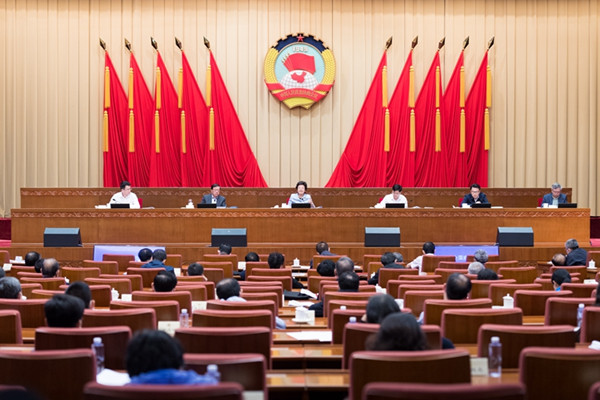CPPCC National Committee briefs on progress in promoting carbon emissions peaking, carbon neutrality

The National Committee of the Chinese People's Political Consultative Conference (CPPCC) convened its 23rd briefing session on issues of major concerns on May 31. [Photo/cppcc.gov.cn]
The National Committee of the Chinese People's Political Consultative Conference (CPPCC) convened its 23rd briefing session on issues of major concerns on May 31 to introduce the latest progress in pursuing peaking of carbon emissions and carbon neutrality.
Li Bin, vice-chairwoman and secretary-general of the CPPCC National Committee, and He Wei, vice-chairman of the CPPCC National Committee and executive vice-chairman of the Central Committee of the Chinese Peasants and Workers Democratic Party, attended the meeting.
In his report to the meeting, Su Wei, deputy secretary-general of the National Development and Reform Commission (NDRC), said that despite the notable progress China has made in cutting carbon emissions and adjusting its energy structure, it still faces significant challenges in the pursuit of peaking of carbon emissions and carbon neutrality.
According to Su, the challenges include a tight timetable for realizing the two goals, great difficulties in finding alternative energies, limits on the development and exploitation of non-fossil energies, the co-existence of high energy consumption, high carbon emissions and low energy efficiency in some industries, inadequate innovation capacity for developing low-carbon emission technology, and insufficient monitoring, calculation and accounting of carbon emissions.
Zhuang Shaoqin, vice-minister of natural resources, suggested in his report to the meeting that it is necessary to strengthen the systemic governance of territory planning and usage, improve intensive use of resources at the source, promote systemic and scientific ecological territory protection and restoration, establish a carbon sink monitoring and accounting system that covers China’s entire ecological system, establish and improve an ecological protection compensation mechanism that can reflect the value of carbon sinks, and explore new technologies for increasing carbon sinks and lowering carbon emissions.
Zhao Yingmin, vice-minister of ecology and environment, noted in his report that stronger CO2 emission control will help to promote green development that features efficient use of resources and low carbon emissions, benefit an economic system of green, low-carbon and recycling development, promote adjustment of economic, industrial, energy, transport and consumption structures, and realize a win-win outcome that both promotes economic growth and tackles climate change.
He said that the ministry will continue to improve carbon intensity evaluation, adjust the country to climate change, promote the low-carbon pilot program, and accelerate the construction of a national carbon trading market.
During the meeting, members of the CPPCC National Committee also discussed with officials from the above-mentioned authorities such issues as the criteria for carbon emission evaluation, development and exploitation of renewable energies without crossing any ecological red line, development of gas power generation, and low-carbon transformation of the construction industry.
Copyright © The National Committee of the Chinese People's Political Consultative Conference.
All rights reserved. Presented by China Daily.
京ICP备08100501号-1

